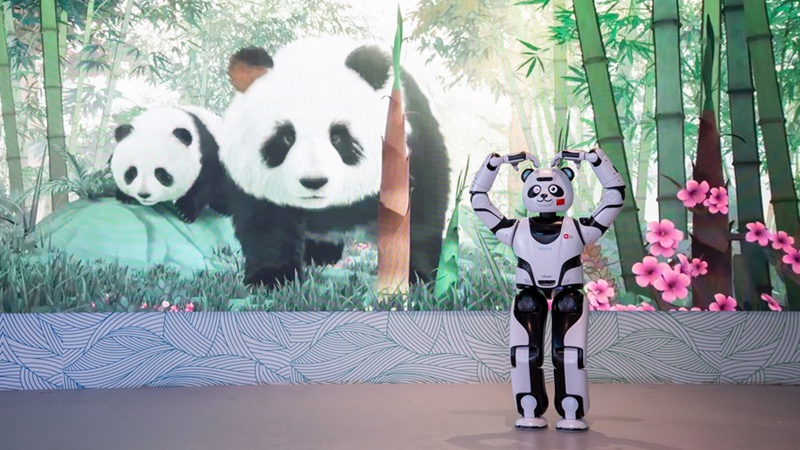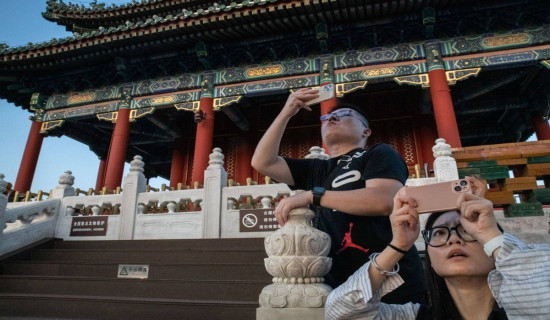- Friday, 23 January 2026
Smart tech changing how Chinese people experience nature
SHENYANG, May 30: Under the mellow May sun, cherry blossoms and peach flowers burst into bloom along the winding trails of Changbai Island forest park, nestled on the banks of the Hunhe River. Qu Qing, a resident of northeastern China's Shenyang City, crouched beside a clump of violet wildflowers with her son, smartphone in hand.
A few taps and seconds later, an artificial intelligence (AI)-supported mobile application delivered the answer "orychophragmus violaceus," known in Chinese as "zhuge cai," a common spring wildflower with medicinal properties.
"Wait, this tiny flower can be used as medicine?" asked the 5-year-old boy, eyes wide with wonder.
"Before, if we didn't recognise a plant, we had to look it up in books," Qu said, demonstrating a plant identification app on her phone. "Now, I just snap a photo, and AI tells me its name, traits, even medicinal uses."
After identifying the flower, the app displayed more than just basic facts. It also offered related poetic references and cultural anecdotes about the plant. For some flowers, it even provides practical planting tips.
AI and other smart technologies, once seen as tethering people to screens, are now pulling people out to the wild by transforming ordinary walks into interactive floral adventures.
A surge of plant-identification apps is helping drive this change.
With just a photo, users can identify flowers in a second using apps like "Xingse," which supports the recognition of over 4,000 common plant species with an accuracy rate exceeding 98 per cent. On Apple's App Store in China, the app has racked up more than 530,000 reviews and boasts an impressive rating of 4.9 stars out of 5.
"As a child, I always wished I could learn the names of the roadside plants and the stories behind them," read one of the most-liked comments. "Now, this app makes that dream come true. I just hope they roll out versions for insects and animals soon."
"Flower Companion," another popular app, leverages the extensive image library of China's plant image database and enables users to identify plants simply by photographing key features such as flowers, leaves, or fruits.
Meanwhile, several domestic AI developers are training large models using deep neural networks and millions of labelled plant images, bringing sophisticated recognition capabilities to everyday users.
As flower-viewing tourism flourishes in China, many apps are going a step further.
Many apps now incorporate big data on plant distribution to recommend nearby locations. Users can explore what's flowering nearby, view images shared by others, and navigate interactive maps to "check in" at hotspots -- making floral outings more social and intriguing.
Tech companies are also diving into plant health. Several companies are now rolling out AI-powered "plant doctors" to help novice growers become confident green thumbs.
One such tool, the "AI・Flower" WeChat mini-program, developed by a Fujian-based tech company named Huaaiwo, has recently been launched and gained attention from both industry professionals and gardening enthusiasts.
When a plant shows signs of trouble, growers can simply snap a few photos and upload them to the mini-program. Powered by advanced image recognition and a vast plant pathology knowledge base, the AI engine quickly analyses the issue.
"We hope to use technology to solve long-standing challenges in traditional gardening, lower the barriers to entry, and let everyone experience the joy of growing plants," said Zheng Zexin, chairman of the company.
The company is also set to launch an intelligent care module that helps growers track the growth of their plants and offers smart reminders for watering and fertilisation based on environmental conditions and plant health. "Like a thoughtful assistant for plant care," Zheng added.
Technology is not replacing nature in people's daily lives, instead, it's reconnecting people with it. As one user commented on the social media platform Douyin, the Chinese version of TikTok. "These apps are like a 'botanical wiki' in everyone's cell phone. Technology hasn't distanced us from nature, it's helped us understand it better and love it more."
















